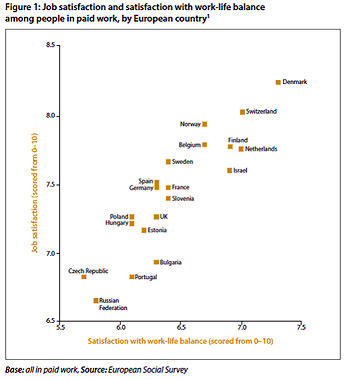Employees are more dissatisfied with their jobs and work-life balance in the UK than in most other European countries. Out of 20 European countries responding, only 6 were more dissatisfied than the UK, according to statistics reported in the British Social Attitudes survey, led by NatCen Social Research.
Indeed, the UK is grouped with former eastern bloc countries, with Slovenia ahead just below France.
Where is this dissatisfaction coming from and is there anything employers can do to reverse the trend? Do they even see the effect this has on productivity and therefore the profit of the business?
The report laid some of the blame with the UK's long-hours culture, particularly because much of the work is unpaid. Shockingly, almost half of UK employees (48 per cent) take on overtime in a typical week with 44 per cent of it being unpaid.
 There's also a perception among workers that 'job quality' has declined during the economic downturn. The report found that people believed the nature of their work had changed for the worse in the last three years with almost a quarter saying they were now doing less interesting work than before. Fewer workers said that there was variety in their work.
There's also a perception among workers that 'job quality' has declined during the economic downturn. The report found that people believed the nature of their work had changed for the worse in the last three years with almost a quarter saying they were now doing less interesting work than before. Fewer workers said that there was variety in their work.
More workers said they worked 'very hard' but one in five reported taking a reduction in pay during the last three years. More workers than before said they were unable to switch off from work, and that they worried about work problems when at home.
More than half of employees say that their workplace has experienced 'a great deal of financial difficulty' in the past three years and fewer workers consider their jobs to be as secure as before.
It's a gloomy picture, but the figures are more complicated than they seem. Although the UK compares badly to other European countries, job satisfaction here has actually increased during the downturn.
This no doubt is partly due to the fact that in times of job scarcety, those in work are more likely to accept worsening conditions; but are grateful they are in work.
The worry of unemployment and the risk to their homes keeps the UK worker open for exploitation.
Even so, there's plenty that could be done to improve satisfaction levels, if only UK employers would address the issue. An effective work-life balance creates a positive, healthy and productive environment in the workplace.
Opportunities for flexible working in tandem with comprehensive stress management programmes can make a big impact on wellbeing and increase employee engagement.
However, much of this depends upon the political climate, and whether or not the right signals is being generated.
With political policies being those of slashing employee rights, maternity rights and health and safety protection; it is hard to see UK employees job satisfaction improving any time soon.
Source: ACAS / European Social Survey

